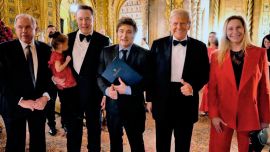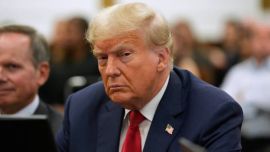With last week one long waiting game for the latest agreement with the International Monetary Front (IMF) and with the potentially decisive PASO primaries now only 15 days away, it would be easy to conclude that nothing is really happening but something did happen – the fiscal and monetary package sneaked through last weekend. Not that it turned out to be any more disguised than the devaluation it also contained, providing a major talking-point to fill the black hole left by the lack of news from Washington.
Last weekend also included announcement of a “medullary” agreement with the IMF, which was both true and false – on the one hand, there is plainly some way to go for even a preliminary agreement with little more than the continuation of negotiations but on the other hand, the Plan B of a devaluation via taxation also has its merits in IMF eyes as bringing fiscal balance closer to this year’s targets, thus averting the prime dangers of hyperinflation and default.
Yet, like almost everything springing out of Economy Minister Sergio Massa’s bag of tricks, it offers short-term advantages (and “petty advantages” to boot, in the “ventajita” label slapped on Massa by ex-president Mauricio Macri) by adding to the problems accumulating for the next government – which might even be the burden of the ruling coalition’s presidential candidate, given the bewildering variety of opinion polls and seesaw provincial results (opposition landslide in Santa Fe one weekend, Peronist triumph in Córdoba the next). Should Massa win an election which many might consider a good one to lose, he could be caught in his own trap of bringing ahead future revenues and postponing future costs – a counterfeit form of fiscal balance.
The bottom line is that almost one percent of the economy is being transferred from the private and productive to the public sector in order to spare the latter any sacrifice – something which smacks of political opportunism as well as fiscal responsibility in this intensely electoral second half of the year, thus further reflecting Massa’s contradictory dual role as economic czar and presidential candidate. Not only does the new tax burden weigh down the economy in general yet further but also foreign trade in particular as a key indicator of underdevelopment in a country which only exports 15 percent of its economy as against a global average of around a third.
Furthermore, while most economists identify the fiscal deficit as the primal cause of inflation, it is not the only route. What might loosely be called the fourth edition of the “dólar soja” (except that soy is almost the only item absent from a preferential exchange rate offered to regional economies and maize) aims at adding US$2 billion to depleted Central Bank reserves but buying dear to sell cheap (paying 340 pesos per dollar which are then sold at the official exchange rate of 270 pesos) also means printing more money to fuel inflation, quite apart from adding to the cost of animal feed. The new surcharges on import purchases (broadly, 7.5 percent on goods and 25 percent on services) will also inevitably find their way into prices.
Nor is there anything in last weekend’s package (short of a couple of billion dollars from farm sales abroad, which are less than the monthly drainage besides being a hope as much as an expectation) to address the bigger problem of running on empty with net reserves several billion in the red. Not that any open rather than creeping devaluation was to be expected in the final fortnight before the PASO primaries, given its explosive impact on prices in the immediate rather than longer term as well as on the quasi-fiscal deficit with the huge volume of dollar-linked bonds. Any final decisions will thus be dictated by whether that electoral verdict points to everything to gain or nothing to lose in the October general elections – the political tail wagging the economic dog, as entirely befits such a consummately political operator as Massa.
In all fairness to the current administration, any government would have problems with the catastrophic scale of this year’s drought making a US$20-billion hole in reserves but this begs the question of why the country does not have a currency of its own in the first place. If “the pound in your pocket” was a central British election issue half a century ago, how many Argentines have a dollar in their pockets and which of the 20 exchange rates would it be worth if they did?




















Comments